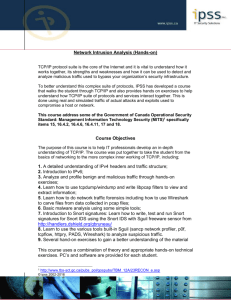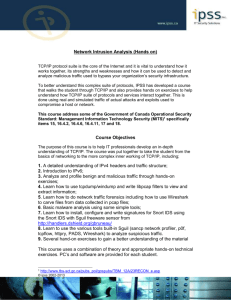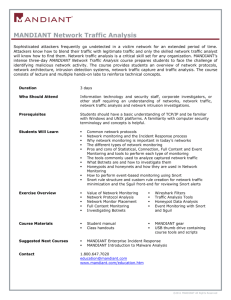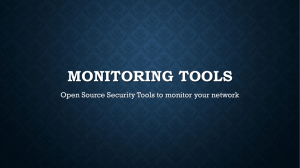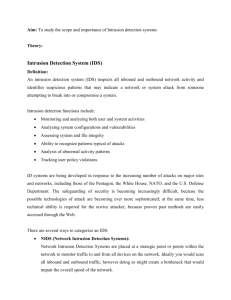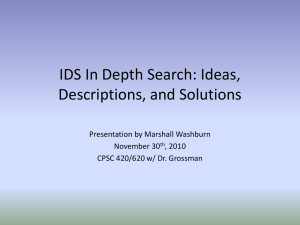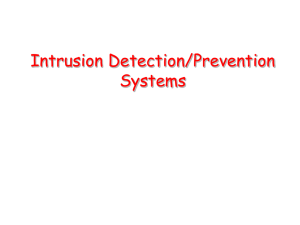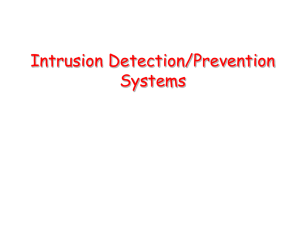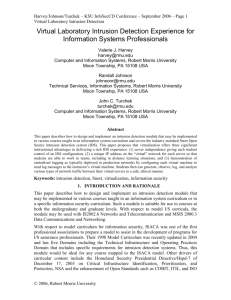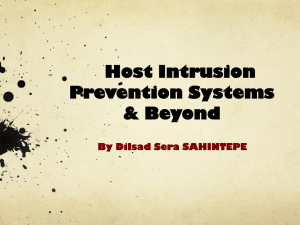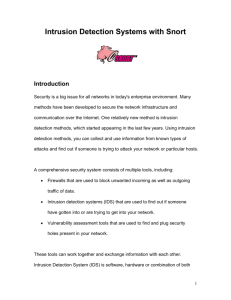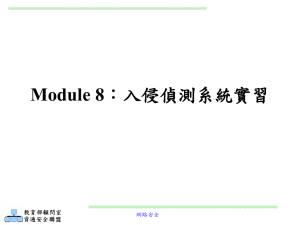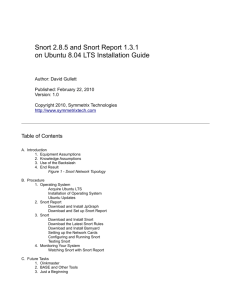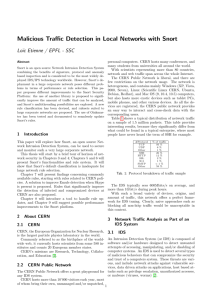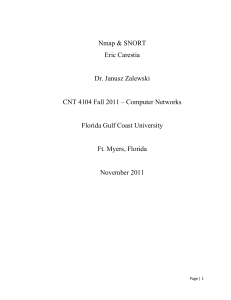study and implementation of advance ids security
advertisement
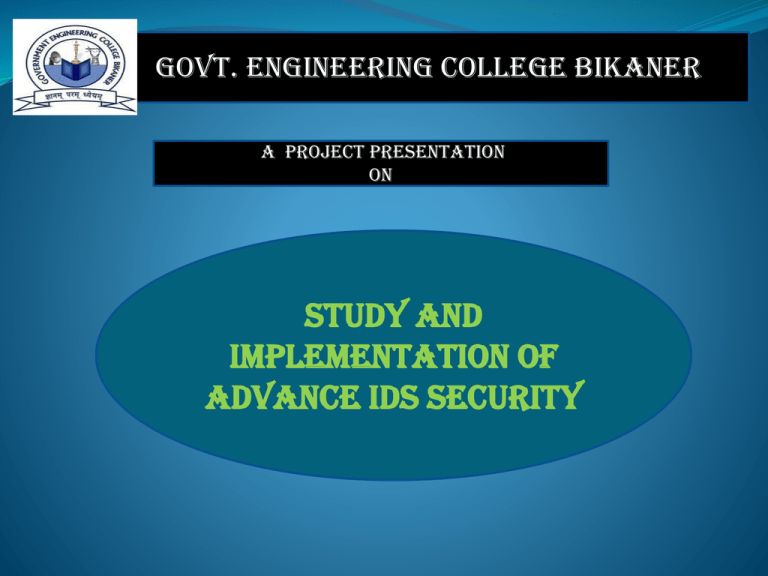
Govt. Engineering College Bikaner A PROJECT Presentation ON STUDY AND IMPLEMENTATION OF ADVANCE IDS SECURITY PROBLEMS In an organization, there are many possible signs of incidents which may go unnoticed each day. These events can be studied mainly by analyzing network behaviour or by reviewing computer security event logs. In order to avoid or minimize the losses from an incident outcome, the events need to be analyzed as close to real-time as possible. ABSTRACT This project presents a solution to bridge logging, log based intrusion detection and network based intrusion detection using well known free open source tools available on the Security Onion Linux Distribution. It walks through the logging, monitoring and alerting approach necessary for security, compliance and quality of service. INTRODUCTION . An intrusion detection system (IDS) is software that automates the intrusion detection process . Network-Based IDS (NIDS) monitors network traffic for particular network segments or devices and analyzes the network and application protocol activity to identify suspicious activity . LOG MANAGEMANT , SIEM OVERVIEW Organizations should deploy one or more centralized logging servers and configure logging devices throughout the organization to send duplicates of their log entries to the centralized logging servers. A log management infrastructure consists of the hardware, software, networks and media used to generate, transmit, store, analyze, and dispose of log data. LOG MANAGEMENT ARCHITECTURE A log management infrastructure typically comprises of three tiers: log generation, log analysis and storage, and log monitoring. LOG GENERATION LOG ANALYSIS AND STORAGE LOG MONITORING LOG MANAGEMENT AND BENIFITS •Detect/Prevent Unauthorized Access and insider Abuse • Meet Regulatory Requirement • Forensic Analysis and Correlation • Ensure Regulatory Compliance • Track Suspicious Behaviour • IT Troubleshooting and Network Operation • Monitor User Activity • Best Practices/Frameworks such as COBIT, ISO, ITIL, etc. • Deliver Reports to Departments • Measure Application Performance PURPOSED ARCHITECTURE This project uses the Security Onion (SO) live CD for setting up of the logging and monitoring system. Snort is used as the intrusion detection engine from the two different kinds of intrusion detection engines, Snort and Suricata , available on SO. Sguil, Squert and Snorby provide the management console to view and classify sensor alerts. SECURITY ONION Security Onion (SO) is a Linux distribution for IDS and NSM (Network Security Monitoring). It is based on Xubuntu 10.04 and contains Snort®, Suricata, Sguil, Snorby , Squert , tcpreplay , hping , and many other security tools. SGUIL Sguil's main component is an intuitive GUI that provides access to real-time events, session data, and raw packet captures. When an alert that needs more investigation has been identified, the Sguil client provides seamless access to the data that is needed to make a decision as how to handle the situation. SQUERT Squert is a web application that is used to query and view event data stored in a Sguil database Squert is a visual tool that attempts to provide additional context to events through the use of metadata, time series representations and weighted and logically grouped result sets . SNORT Snort is an open source network intrusion prevention and detection system (IDS/IPS) developed by Source fire. Combining the benefits of signature, protocol, and anomaly-based inspection, it is the most widely deployed IDS/IPS technology . SNORBY Snorby is a front end web application (scripted in Ruby on Rails) for any application that logs events in the unified2 binary output format. Snorby integrates with intrusion detection systems like Snort, Suricata and Sagan . OSSEC OSSEC is an Open Source Host-based Intrusion Detection System (HIDS). It performs log analysis, integrity checking, Windows registry monitoring, rootkit detection, real-time alerting and active response. ELSA Enterprise Log Search and Archive (ELSA) is a centralized syslog framework built on Syslog-NG, MySQL, and Sphinx full-text search. It provides a fully asynchronous web-based query interface that normalizes logs and makes searching billions of them for arbitrary strings as easy as searching the web . CONFIGURATION OF SECURITY ONION RULES Snort and OSSEC have a large number of rule sets available to choose from. Large numbers of anomalies are detected right from the start using these rule sets. These rule sets needs to be tuned to reduce the number of false positives. NIDS sensor works with Snort rules to alert on a network event of interest. SNORT RULES Snort rules are powerful, flexible and relatively easy to write. All Snort rules follow a very simple format and define what Snort should watch for as it inspects packet header, payload or both. Snort rules are divided into two logical sections, the rule header and the rule body. LOG ANALYSIS AND CORRELATION Log analysis is an art and is geared towards narrowing down to the events of interest. Analyst needs to focus on recent changes, failures, errors, status changes, access and administration events, and other events unusual for your environment. Hence, it is important to minimize noise by removing routine, repetitive log entries from the view after confirming that they are benign. EVENT ANALYSIS Analysis typically begins with Snort or OSSEC alerts displayed on the Sguil console in near real time. Analysts can then categorize the alert based on type of activity or escalate the alert to a more senior analyst for further analysis EVENT CORRELATION It becomes easier to correlate events by having multiple sensors feeding different types of events into the same analysis console. Correlating activities across different logs provides a comprehensive picture of the chain of events. Analysts need to develop theories about what occurred and explore logs to confirm or disprove those theories. AUTO CATEGORIZATION Sguil can automatically categorize events by editing the autocat.conf file at/etc/nsm/securityonion/ on the Sguil server. These event will have a status automatically assigned to them and will not appear in any analyst's console LOG ALERTING REPORTING The sensor alerts on Security Onion are sent to both the Snorby and Sguil MySQL databases on the master server. Therefore, there are two different ways to perform analysis and reporting based on the database source. Alert notifications can be produced in different ways as well. ALERT CLASSIFICATION AND PRIORITY Real-time alerting with Snort is highly customizable. Alerts that need to result in real time notification can be chosen by assigning a priority to each rule, and by rule classifications. Each rule can have an individual priority attached to it, and every rule can be included in a classification of rules that has a priority attached to it. EMAIL ALERTS Sguil’s email alerting configuration is in the file sguild.email located at/etc/nsm/securityonion/ and it contains email related information such as smtp server, from to email ids etc REPORTING Sguil offers few basic reporting but lacks the mechanism to schedule reports, and reports with charts and graphs. Plain text or email reports are created by selecting the events to report and choosing appropriate report type from the report menu. Summary reports contain the full packet headers while detail reports add the payloads as well. CONCLUSION This project shows the importance of log managements and network monitoring for the effective security monitoring and compliance of an organization. It provides an open source solution to a complex and very common challenge of log management and network monitoring. The solution is based on a framework provided by the Security Onion Linux Distribution, which makes it possible to integrate necessary applications on one platform. It tries to provide a cost effective logging, alerting and monitoring solution alternative to the organizations that cannot afford commercially available SIEM (Security Information and Event Management) solutions. REFRENCES Bianco, David J. (2012). Open Source Network Security Monitoring With Sguil. Retrieved from http://www.vorant.com/files/nsm_with_sguil.pdf Burks, Doug (2012). Security Onion. Retrieved from http://securityonion.blogspot.com/ Chuvakin, A & Zeltser, L. (2012). Critical Log Review Checklist for Security Incidents. Retrieved from http://zeltser.com/log-management/security-incident-logreviewchecklist. html Cid, Daniel B. (2007). Log Analysis using OSSEC. Retrieved from http://www.ossec.net/ossecdocs/ auscert-2007-dcid.pdf Holste, M. (2012). Enterprise-log-search-and-archive. Retrieved from http://code.google.com/p/enterprise-log-search-and-archive/ THANK you

